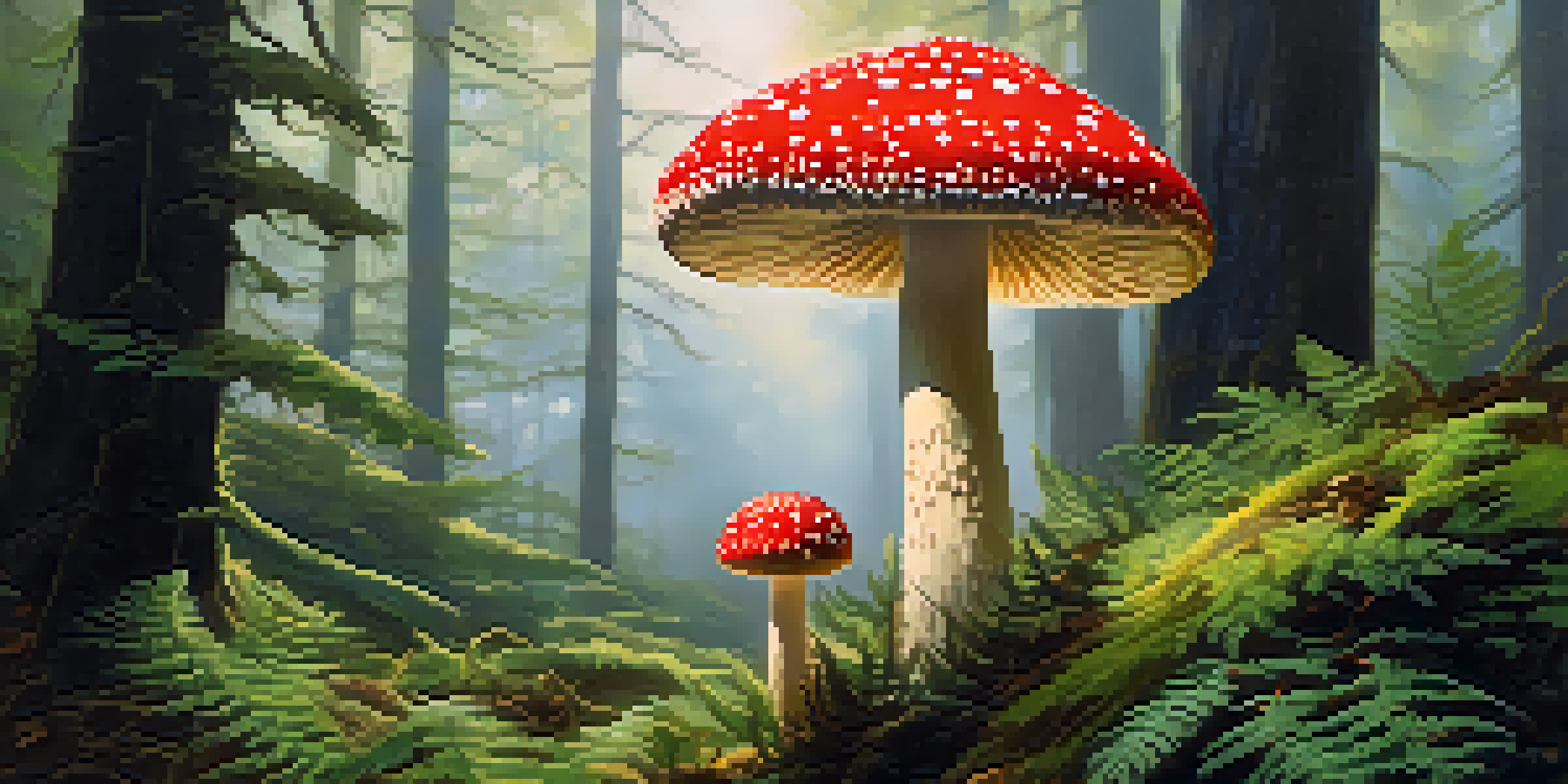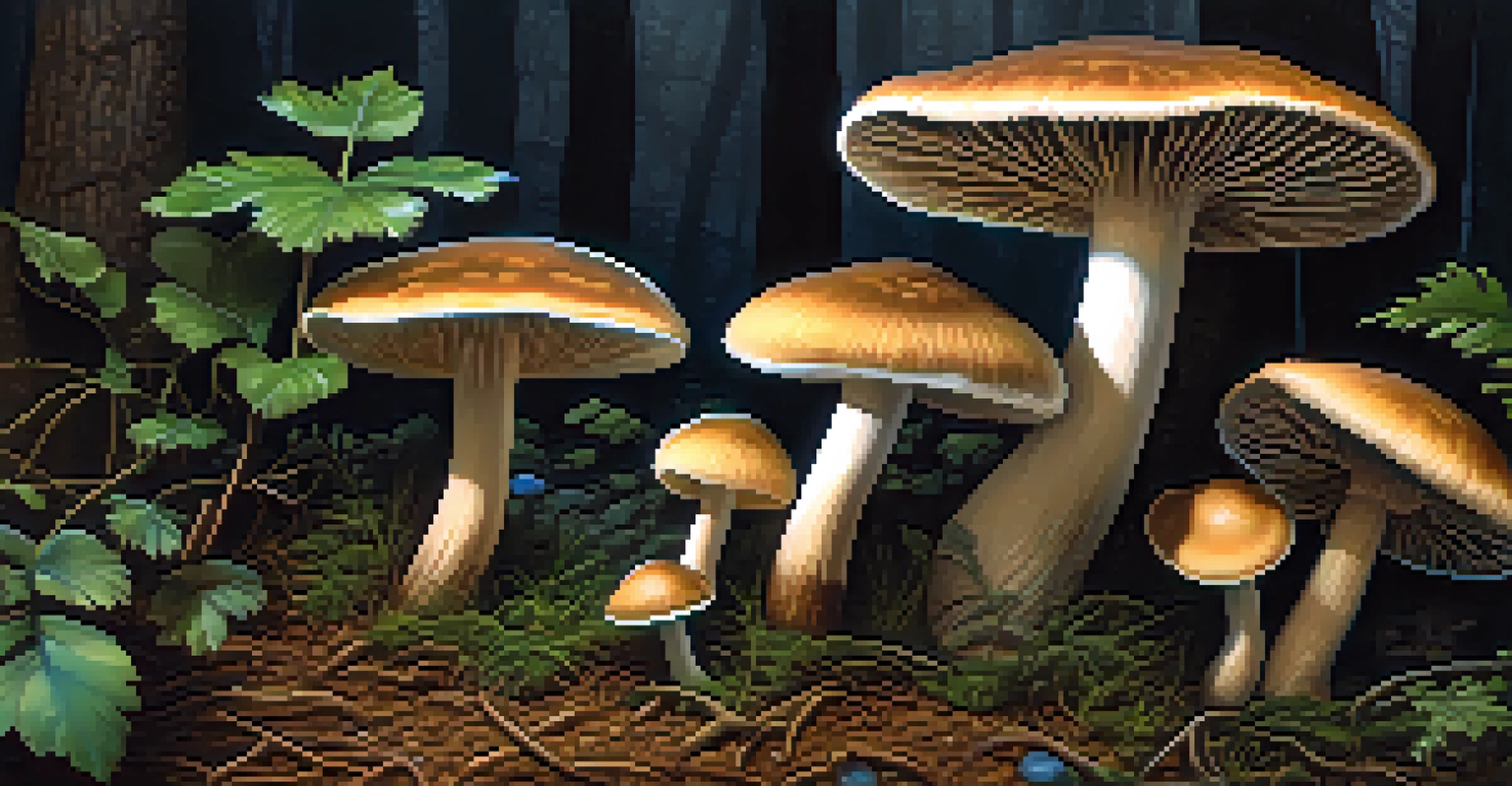The Significance of Mushrooms in Siberian Shamanic Practices

Understanding the Connection Between Mushrooms and Shamanism
Mushrooms have long been regarded as sacred in various cultures, but in Siberian shamanism, their significance runs particularly deep. These fungi are not merely food items; they represent a bridge between the physical and spiritual worlds. For many Siberian shamans, mushrooms are tools for entering altered states of consciousness, allowing them to connect with the spirit realm.
The use of mushrooms, especially those with psychoactive properties, is seen as a way to enhance spiritual experiences and gain insights.
The use of mushrooms, especially those with psychoactive properties, is seen as a way to enhance spiritual experiences and gain insights. When consumed, these mushrooms can induce visions or hallucinations, which are integral to shamanic journeys. This transformative experience is often described as a form of communion with nature and the universe.
Additionally, the role of mushrooms can be seen as a reflection of the environment in Siberia, where these fungi thrive. Their presence is a reminder of the interconnectedness of all life, as shamans harness their power to understand and heal the communities they serve.
The Types of Mushrooms Used in Shamanic Practices
In Siberian shamanism, certain mushrooms stand out for their psychoactive properties. One of the most notable is the Amanita muscaria, commonly known as the fly agaric. Recognizable by its striking red cap with white spots, this mushroom has been used for centuries in rituals aimed at inducing trance states.

Shamans often prepare and consume these mushrooms in specific ways to maximize their effects. This preparation can include drying, boiling, or even mixing them with other substances to enhance their psychoactive qualities. Each method serves to unlock different aspects of the mushroom's potential, making the experience unique to the individual shaman.
Mushrooms Bridge Physical and Spiritual
In Siberian shamanism, mushrooms serve as tools for entering altered states of consciousness, connecting practitioners with the spirit realm.
Beyond Amanita muscaria, other fungi like Psilocybe species are also utilized in various regions. These mushrooms are often revered for their ability to facilitate deeper spiritual introspection, allowing shamans to access profound wisdom and guidance from the spirit world.
Mushrooms as Tools for Healing and Insight
Siberian shamans often use mushrooms not just for spiritual journeys but also for healing practices. During their altered states of consciousness, they may gain insights into the physical and emotional ailments of their community members. This unique perspective allows them to provide guidance and remedies that might not be accessible in ordinary states of mind.
Mushrooms hold a place of reverence in the cultural fabric of Siberian life.
The healing process is deeply intertwined with the shaman's relationship with the mushrooms. The visions experienced during the trance can reveal underlying issues that need to be addressed, making the mushroom a critical part of the healing journey. This aspect of shamanism emphasizes the holistic nature of health, considering both body and spirit.
Moreover, the communal aspect of healing rituals often includes the sharing of experiences and insights gained from mushroom journeys. This collective sharing fosters a sense of unity and support within the community, reinforcing the idea that healing is a shared journey rather than an isolated experience.
The Cultural Significance of Mushrooms in Siberian Society
Mushrooms hold a place of reverence in the cultural fabric of Siberian life. They are often featured in folklore and rituals, symbolizing the connection between humans and nature. This cultural significance reinforces the idea that mushrooms are not just natural resources but sacred entities worthy of respect and care.
Many Siberian tribes have unique stories and traditions surrounding mushroom use, passed down through generations. These narratives often highlight the teachings of ancestors and the lessons learned through their interactions with these fungi. Such stories contribute to a rich tapestry of cultural heritage that values the wisdom of nature.
Healing Insights Through Mushrooms
Siberian shamans utilize mushrooms not only for spiritual journeys but also for gaining insights into community health and emotional well-being.
In contemporary times, there is a renewed interest in these ancient practices as people seek deeper connections with nature. This cultural revival underscores the importance of preserving traditional knowledge and practices surrounding mushrooms, ensuring that future generations can learn from the past.
Mushrooms and the Shamanic Journey: A Personal Experience
For many shamans, the experience of consuming mushrooms is deeply personal and transformative. It is not just about the physical effects but also the profound insights gained during the journey. One shaman might describe feeling guided by ancestral spirits, while another may experience a sense of unity with the natural world.
These journeys are often accompanied by rituals, music, and dance, creating a sacred space for the experience. This communal approach enhances the experience, as participants support one another through the journey, reinforcing the bonds of community and shared understanding. The collective energy amplifies the shamanic experience, making it even more powerful.
Personal stories from shamans emphasize the importance of preparation and intention. Each journey is treated with respect and care, ensuring that the experience is meaningful and beneficial. This thoughtful approach to mushroom use underscores their significance in shamanic practices.
Modern Perspectives on Siberian Shamanism and Mushrooms
As interest in alternative healing and spirituality grows globally, so does the fascination with Siberian shamanism and its use of mushrooms. Many people are drawn to the idea of using natural substances for healing and personal growth, prompting a resurgence in traditional practices. This modern curiosity is often met with respect for the cultural roots of these practices.
However, it's crucial to approach this interest with sensitivity and understanding. Misappropriation of cultural practices can lead to misunderstandings and disrespect towards the traditions of indigenous peoples. Engaging with these practices should be done thoughtfully, aiming to honor the wisdom and significance behind them.
Cultural Reverence for Mushrooms
Mushrooms are woven into the cultural fabric of Siberian society, symbolizing the deep connection between humans and nature while emphasizing respect for traditional practices.
In this context, education and awareness play vital roles. By learning about the historical and cultural significance of mushrooms in Siberian shamanism, individuals can foster a deeper appreciation for these traditions. This knowledge encourages responsible engagement, allowing modern seekers to connect with the past while respecting its boundaries.
The Future of Mushrooms in Shamanic Traditions
Looking ahead, the future of mushrooms in Siberian shamanic practices appears both promising and complex. As environmental changes threaten natural ecosystems, the availability of these sacred fungi may be at risk. Conservation efforts are essential to ensure that future generations can continue to access and honor these important resources.
At the same time, the ongoing dialogue about the benefits of psychedelics in therapeutic settings may open new avenues for understanding the role of mushrooms. Researchers are increasingly exploring the therapeutic potential of psychedelics, including those used in shamanic practices, which could lead to a broader acceptance and integration of these traditions in modern healing.

Ultimately, the enduring significance of mushrooms in Siberian shamanism will depend on the commitment to preserve these practices and the wisdom they carry. By valuing their cultural roots and promoting sustainable practices, we can ensure that mushrooms remain a vital aspect of shamanic traditions for years to come.